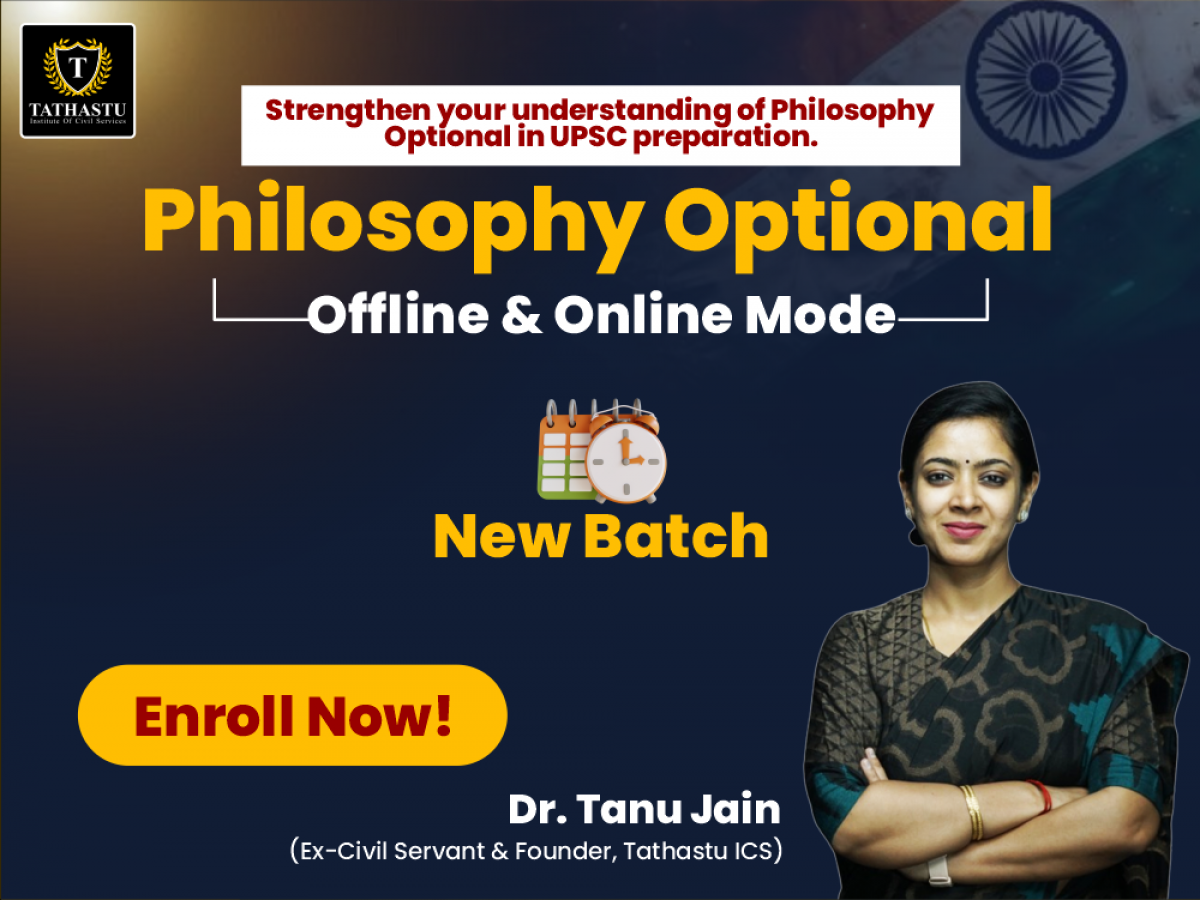Special Batch Available Morning & Evening
Click Here
The Philosophy syllabus for the UPSC Mains Exam covers a wide range of topics, both from Western and Indian philosophical traditions. It is divided into two papers: Paper I, which covers the history and major problems of philosophy, and Paper II, which focuses on socio-political philosophy and the philosophy of religion. This syllabus is meant to test how well candidates understand the material, their ability to think analytically, and their skill in presenting complex ideas clearly.
Philosophy as an optional subject is both challenging and intellectually stimulating. It helps develop critical thinking and offers a deep understanding of key questions about existence, knowledge, ethics, and the nature of reality. Going through the syllabus will give you a clear idea of what to expect from the subject, highlighting the main areas of study and how to approach the the topics effectively.
1. Plato and Aristotle : Ideas; Substance; Form and Matter; Causation; Actuality and Potentiality.
2. Rationalism (Descartes, Spinoza, Leibniz); Cartesian Method and Certain Knowledge; Substance; God; Mind-Body Dualism; Determinism and Freedom.
3. Empiricism (Locke, Berkeley, Hume) : Theory of Knowledge; Substance and Qualities; Self and God; Scepticism.
4. Kant: Possibility of Synthetic a priori Judgments; Space and Time; Categories; Ideas of Reason; Antinomies; Critique of Proofs for the Existence of God.
5. Hegel : Dialectical Method; Absolute Idealism.
б. Moore, Russell and Early Wittgenstein : Defence of Commonsense; Refutation of Idealism; Logical Atomism; Logical Constructions; Incomplete Symbols; Picture Theory of Meaning; Sying and Showing.
7. Logical Positivism : Verification Theory of Meaning; Rejection of Metaphysics; Linguistic Theory of Necessary Propositions.
8. Later Wittgenstein : Meaning and Use; Language- games; Critique of Private Language.
9. Phenomenology (Husserl): Method; Theory of Essences; Avoidance of Psychologism.
10. Existentialism (Kierkegaard, Sarte, Heidegger): Existence and Essence; Choice, Responsibility and Authentic Existence; Being-in-the-world and Temporality.
11. Quine and Strawson : Critique of Empiricism; Theory of Basic Particulars and Persons.
12. Carvaka : Theory of Knowledge; Rejection of Transcendent Entities.
13. Jainism : Theory of Reality; Saptabhanginaya; Bondage and Liberation.
14. Schools of Buddhism : Prat Ityasamutpada; Ksanikavada, Nairatmyavada.
15. Nyaya—Vaiesesika : Theory of Categories; Theory of Appearance; Theory of Pramana; Self, Liberation; God; Proofs for the Existence of God; Theory of Causation; Atomistic Theory of Creation.
1б. Samkhya; Prakrit; Purusa; Causation; Liberation.
17. Yoga; Citta; Cittavrtti; Klesas; Samadhi; Kaivalya.
18. Mimamsa: Theory of Knowledge.
19. Schools of Vedanta : Brahman; Isvara; Atman; Jiva; Jagat; Maya; Avida; Adhyasa; Moksa; Aprthaksiddhi; Pancavidhabheda.
20. Aurobindo: Evolution, Involution; Integral Yoga.
1. Social and Political ldeals : Equality, Justice, Liberty.
2. Sovereignty : Austin, Bodin, Laski, Kautilya.
3. Individual and State : Rights; Duties and Accountability.
4. Forms of Government : Monarchy; Theocracy and Democracy.
5. Political Ideologies: Anarchism; Marxism and Socialism.
б. Humanism; Secularism; Multi-culturalism.
7. Crime and Punishment : Corruption, Mass Violence, Genocide, Capital Punishment.
8. Development and Social Progress.
9. Gender Discrimination : Female Foeticide, Land and Property Rights; Empowerment.
10. Caste Discrimination : Gandhi and Ambedkar.
1. Notions of God : Attributes; Relation to Man and the World. (Indian and Western).
2. Proofs for the Existence of God and their Critique (Indian and Western).
3. Problem of Evil.
4. Soul : Immortality; Rebirth and Liberation.
5. Reason, Revelation and Faith.
б. Religious Experience : Nature and Object (Indian and Western).
7. Religion without God.
8. Religion and Morality.
9. Religious Pluralism and the Problem of Absolute Truth.
10. Nature of Religious Language : Analogical and Symbolic; Cognitivist and Non-cognitive.

The UPSC Philosophy Optional Subject syllabus is divided into two papers:
Each paper in the Philosophy Optional Subject is worth 250 marks, making a total of 500 marks for the optional subject in the UPSC Mains Exam.
Paper I includes topics such as:
Paper II includes topics such as:
Choose Philosophy if you have an interest in exploring fundamental questions about existence, knowledge, ethics, and reality. A background in philosophy can be helpful but is not necessary. Review the syllabus and previous years' question papers to assess your comfort level with the subject.
Standard textbooks and reference books, such as "A Critical History of Western Philosophy" by Y. Masih, "Indian Philosophy" by S. Radhakrishnan, and "Introduction to Indian Philosophy" by D.M. Datta, are highly recommended. Additionally, practice with previous years' question papers and join study groups or coaching classes if needed.
Answer writing practice is crucial for Philosophy. It helps in presenting complex ideas clearly and concisely. Regular practice also improves your ability to structure answers logically and coherently.
Start with the basic concepts and major philosophers in both Western and Indian traditions. Gradually move to more complex topics. Allocate time for regular revision and focus on understanding rather than rote memorization.
Practice writing answers within a time limit to improve speed and accuracy. Allocate specific time slots for each question during the exam and stick to your schedule to ensure you complete the paper on time.
Regular revision is essential for retaining philosophical concepts and theories. Set aside dedicated time for revision each week and increase the frequency as the exam date approaches. Use summary notes and mind maps for quick revisions.
Yes, previous years' question papers are available on the official UPSC website and various educational platforms. Practicing these papers can give you a good understanding of the exam pattern and types of questions asked.
Engage with primary texts by major philosophers, participate in discussions and debates, and seek guidance from experts or mentors. Additionally, writing essays on philosophical topics can help clarify your understanding and improve your analytical skills.